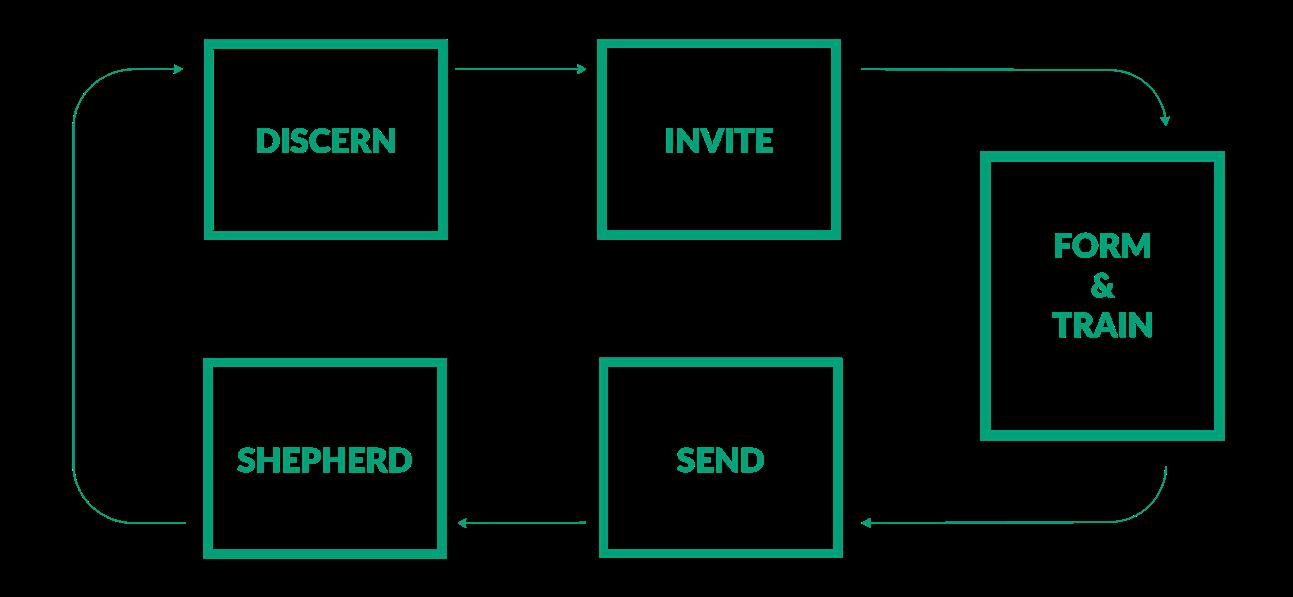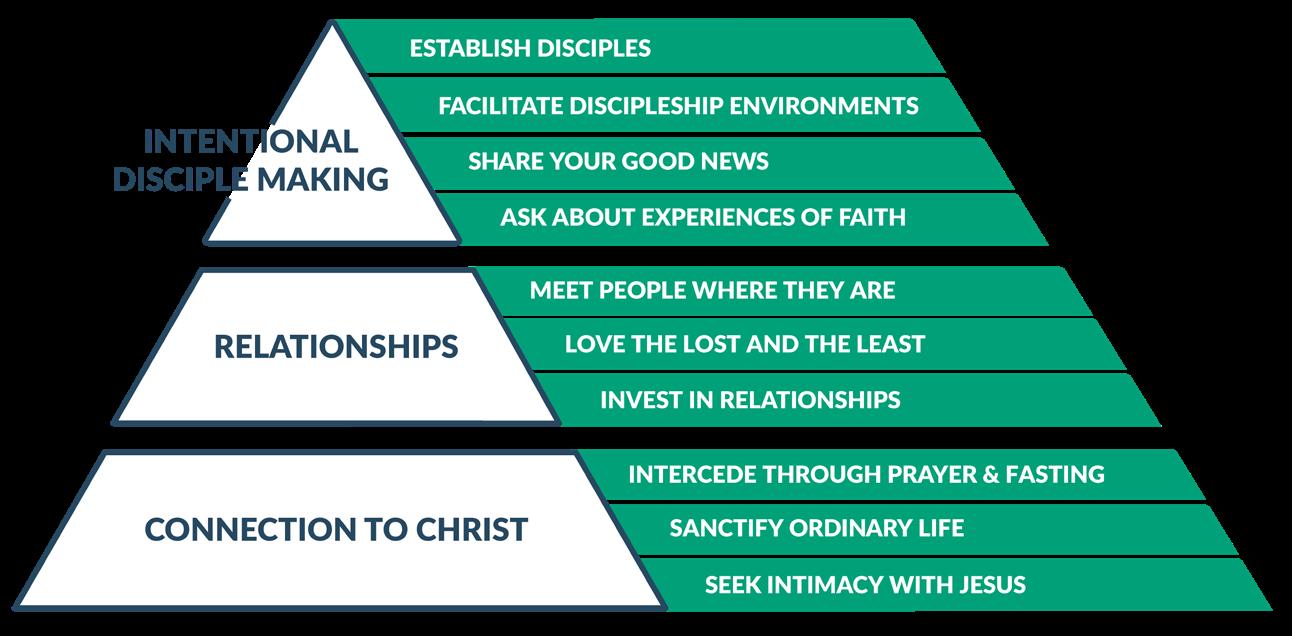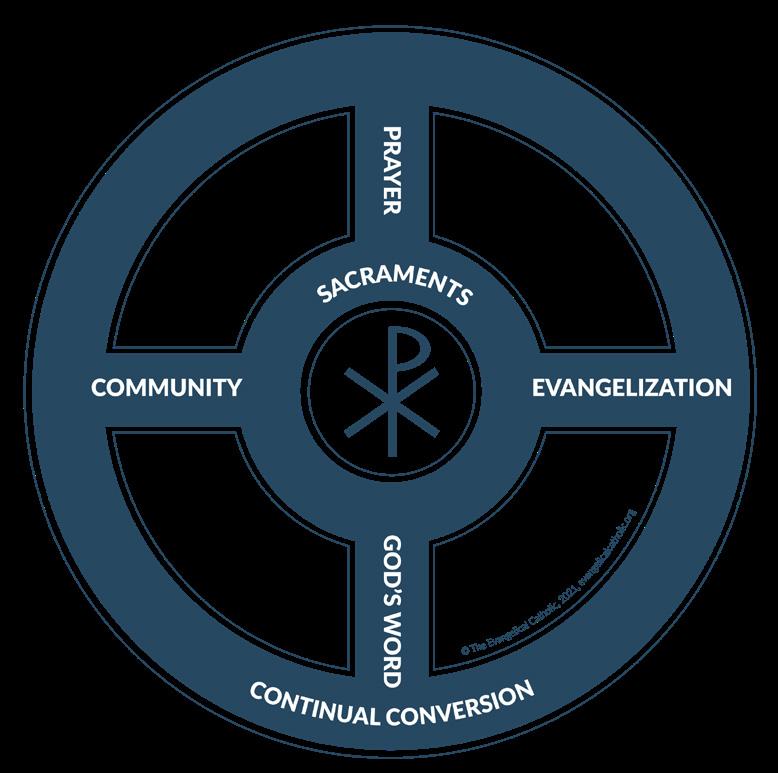
13 minute read
An Approach that Works
CHAPTER 4 AN APPROACH THAT WORKS
So far, I have introduced the theological and pastoral principles needed to guide a true shift from maintenance to mission. But what does it look like lived out? In what follows, I apply the theological and pastoral principles introduced so far to a specific, effective process used by many communities in the United States. The Evangelical Catholic (EC) developed this process over decades of fruitful implementation in hundreds of parishes, college campus ministries, and military bases all over the country, and in some international communities.
Advertisement
Pastoral workers begin applying Jesus’ mission process by discerning the most faithful, available, and teachable parishioners they know, who desire formation for their secular vocation, and
who want to change the world. They invite six to twelve of them into an initial process of formation and training for mission. Even during this period, but then again at the end, they send them back to their circle of influence to sanctify it. Then pastoral workers shepherd them in their lifelong quest to walk in holiness and mission, to put Christ at the summit of all things.
If a pastoral worker runs the above mission process twice a year, bringing two cohorts of six to twelve parishioners through the initial period of formation and training and sending them back to their spheres of influence, in a few short years they will be shepherding armies of missionary disciples, missionary disciples equipped to sanctify the temporal order and engage the many people in their lives whom the pastoral worker cannot reach.
What is the curriculum for this period of formation and training? What does it look like?
The laity need a curriculum of mission formation for deeper apostolic consciousness and corresponding attitudes and habits. Additionally, this curriculum trains them in the skills (or competencies) they need for apostolate in the world, such as conversational skills, recognizing thresholds of continual conversion, facilitating group discussions, and more. For example, at the Evangelical Catholic, we created a curriculum arranged around what we call the Heart and Habits of Mission, shown below.
The Heart and Habits of Mission

The curriculum also forms parishioners’ consciousness of their identity in Christ and in the core attitudes and habitual disciplines of life in Christ. We call these the Heart and Habits of Discipleship, 1 depicted below.
The Heart and Habits of Discipleship

The initial period of mission formation lasts several months. It consists of weekly group meetings and biweekly one-on-one spiritual guidance. Together, these walk people progressively through the above topics. The formation—both in content and logistics—is calibrated for those with secular, busy lives. It deepens the connection to Christ they are already living, casts a clear vision for their secular character, and gives them an outward orientation. In our experience, this period consistently enlivens them, as they are formed and affirmed in their God-given, secular vocation. Most lay people have never before heard their vocation positively articulated and find the formation to be powerful and liberating.
Both group formation and individual spiritual guidance are needed. Group formation provides inspiration, community,
1 The Heart and Habits of Discipleship are based on the “Tasks of Catechesis,” found in the General Directory for Catechesis, nos. 84-87.
connection to something bigger, and the space to deliver formative content in an efficient and effective manner. Individual spiritual guidance by pastoral workers allows them to provide particular formation in a flexible and customized way that takes into consideration the needs, circumstances, and desires of the individual. This one-on-one guidance allows for individualized application, encouragement, and support.
The period of initial formation eventually gives way to a lifetime of individual spiritual guidance and ongoing group formation (in reduced frequency). Ongoing formation helps each individual “own” their discipleship and apostolate. Ownership is a marker of a mature Christian personality, a person who is nothing other than themself acting as an instrument of God’s presence and action in the world.2
Providing ongoing, highly personalized shepherding of a growing community of missionary disciples may seem inefficient, but it is necessary. The variety of individuals’ personalities, interior and external landscapes of personal holiness, and personal apostolates are constantly changing. There are ups and downs, detours and straightaways. The community is made up of individuals who need personalized care. Thus the shepherding must be individualized, for building and shepherding a community of renewal hinges on shepherding individuals.3
Common Concerns
Most pastoral workers intuitively understand the need for a new paradigm and are open to a new approach. However, the implications and consequences of this approach long term quickly cause them to question its viability. They have never experienced
2 For more on the necessity of an integrated and holistic approach to apostolic formation, see “The Need for Deprofessionalizing Evangelization” by Peter Andrastek, University of Notre Dame Church Life Journal, A Journal of the McGrath Institute for Church Life, January 30, 2020. https://churchlifejournal.nd.edu/ articles/deprofessionalizing-the-apostolate/.
3 For more on the necessity of individualized shepherding, see “Chief Obstacles to Good Spiritual Direction,” by Peter Andrastek, University of Notre Dame Church Life Journal, A Journal of the McGrath Institute for Church Life, January 17, 2019, https:// churchlifejournal.nd.edu/articles/chief-obstacles-to-good-spiritual-direction/.
Chapter 4 | An Approach that Works 45 this kind of ministry. They worry it will conflict with the current pastoral/professional structures, ways of doing things, and even the culture of “parish life.” Because they have not yet developed the relevant conceptual or experiential categories, they have a hard time imagining how a mission-oriented ministry will develop.
In a way, ushering in a new process and paradigm is like growing a family. When a young couple first marries, they have no idea what it takes to raise several children. They don’t know how much money, time, energy, and emotional bandwidth they need—they cannot imagine it. In a very certain sense, if they think too much about the unknowns of parenthood, they risk intimidating and paralyzing themselves until they are closed off to having a large family, or any children at all. But as they have children, and strive to be generous and open to life, they learn what it takes to raise one, two, and eventually a few kids. Over the years, they get better at projecting what the food budget will be, when they’ll need another bedroom, when to start saving for various items, projects, and so on. They develop rules and structures for family life that work for them. And they develop the proper roles needed to care for everyone in a holistic way. Like starting a new family and growing it over the years, developing mission-oriented ministry cannot be planned out from start to finish ahead of time. Parishes must take steps forward in faith, in the right direction, that open up a new reality, expanding and heightening their understanding of what their parishioners need to flourish and their community needs to grow. Along the way, the parish builds structures and roles to support ongoing formation and growth.
Nevertheless, it is helpful to address some of the more common questions that arise as soon as pastoral workers intuit that this paradigm shift will be difficult.
This seems so time consuming! What about all the other things going on in the parish?
True. Shepherding a growing movement of missionary disciples is time consuming. There is no simple way around that. But it
doesn’t have to be an insurpassable obstacle. How badly does the pastor want to change the paradigm? If the pastoral staff continue to run the same ministries and programs year after year, change will not happen. People will continue to drift, and whatever trajectory the parish is on toward merging, closing, plateauing will continue.
That being said, don’t take the ax to everything—at least, not yet. The current problems did not arise overnight, and they will not disappear overnight. At first, pastoral workers can let most things

be while carving out time to run the mission process. If a pastor starts by devoting one of his pastoral staff (or even himself!) to this work for fifteen to twenty hours per week they can get the movement started over the first year to two.
The movement grows incrementally, and once the pastoral staff becomes familiar with what it takes to build and shepherd people in a growing community of missionary disciples, they can more easily project future demands on their time and energy. Because the staff has this mustard seed of experience from running the mission process a few times, they will be able to creatively and proactively imagine what could be, even years down the road. And they can proactively address the impact these changes will have on inherited ministry structures.
But only a few people are already living lives of discipleship. Won’t we quickly run out of people to form as missionary disciples?
No. As more parishioners are formed in the Heart and Habits of Mission, they will ignite others as disciples, readying more people to receive mission formation. That being said, this does not happen quickly or automatically. Pastoral staff must also, over time, become adept at “shaking the branches”—constantly seeking out people who have the disposition to be formed, creating funnels into mission formation, and preparing the way for mission formation by inculcating a love of Jesus and invitation to discipleship in the broader population.
What if the people we’re looking for are already engaged in ministries?
Some will be, and that’s okay. The mission process does not necessarily pull people out of parish ministries. As the pastoral staff provide apostolic formation, they will recalibrate people’s vision for their apostolate.
Many people equate being a good Catholic (and even evangelization) with parish ministry involvement to the neglect of personal apostolate in their secular lives. They have no other picture of a faithful life to draw on. The formation proposed here simply balances their vision by introducing their primary vocation to secular apostolate among their peers: family, friends, coworkers, neighbors, and everyone they encounter. The mission formation, in addition to forming them for apostolate to their peers, will also make them more effective in their current ministries because it will deepen their supernatural outlook and give them evangelical skills. Even if over time some people leave involvement in parish ministries, it will be God’s will, because their formation teaches them to make decisions through prayerful discernment and under the shepherding care of the pastor and/ or pastoral staff. No matter what, the Church will be more fruitful as they follow the Holy Spirit!
How are we going to care for all these people?
We can almost guarantee from our experience that when one pastoral staff person runs the process of mission formation twice a year, within three years, that staff person is shepherding thirty
to forty missionary disciples who are growing in their interior lives and living intentional, personal apostolate in their spheres of influence. A vibrant, growing movement of evangelization like this will soon stress the inherited maintenance structures of the parish, forcing the pastor to make decisions that prioritize growth. This is a good thing! After all prioritization is about actual decisions, not just intentions.
And congratulations. Stressing the inherited parish structures is the first step toward moving into a legitimate apostolic structure. If the pastor and pastoral leadership stay the course—without compromise—they will creatively shift responsibilities, hire people, and find more help (not without pain and difficulty) to shepherd this growing army of missionary disciples.
The parish indeed “possesses great flexibility [and] can assume quite different contours depending on the openness and missionary creativity of the pastor and the community.”4 As the pastor and parish leadership grow in their openness to make decisions based on missionary creativity, they will incrementally usher in a new paradigm of mission among the Church in their community.
New Paradigms Demand New Zeal and Excellence
This new apostolic paradigm for parishes (actually the original paradigm in the Church) demands something new from priests and pastoral workers. They need a new spiritual fervor, characterized by ever-increased fidelity to personal prayer, the sacraments, the teachings of the Church, and personal virtue; in sum: personal holiness. Their personal holiness must be everincreasingly apostolic, not just in their professional and ministry spheres, but also in their personal lives. Priests and pastoral workers must pray every day for increased apostolic zeal and creativity and then create situations to live this way, both personally and professionally. An apostolic paradigm also demands a new caliber of Church professionals who hold excellence, proactivity, focus, and tenacity in the highest regard. Moreover, they will need a new
4 Pope Francis, Evangelli gaudium, sec. 28.
Chapter 4 | An Approach that Works 49 type of flexibility, because priests and pastoral workers (and the sacraments) must be available when lay people are: evenings, early mornings before work days begin, and weekends. The shift may even require a new degree of mobility to reach very busy people where they are, not in a figurative sense but quite literally. These changes may cause discomfort or demand sacrifice, but they are necessary. Finally, ministry in a missionary tone requires a new level of relational intelligence and ability, for pastoral workers in this paradigm are less program coordinators and more shepherds of souls.

As already indicated, none of this happens overnight. The road ahead is long and arduous and at times can feel more like losing than winning. Difficult conversations, unpopular decisions, angry parishioners and pastoral staff, and perhaps even friendly fire and challenging questions from the diocese will arise. But this is precisely the mystery of the Cross, and the Cross demands that suffering and death precede new life.
The Evangelical Catholic Helps Parishes Move to an Apostolic Paradigm
Fortunately, pastoral workers do not have to navigate this change and figure it all out on their own. The Evangelical Catholic exists precisely to lead and accompany ministries through the paradigm
shift from maintenance to mission. Since 1999 we have been developing and executing this approach and guiding ministries into this new reality. We partner with parishes, campus ministries, and other communities who are serious about moving from maintenance to mission and ready to put in the work to make it happen. We provide vision, formation, training, and ongoing support for the pastor and pastoral staff. They have access to a robust learning management system and personalized consulting, helping them apply the mission process in their unique community. We also offer onsite visits for staff formation, in-depth training, and strategy, as well as large-scale events to impact parishioners at large. As we serve hundreds of communities implementing an apostolic mission process in real time, we are always learning and developing new material and improved approaches. Our only mission is to serve the Church by unleashing the transformative power of the gospel in the world through the apostolate of the laity.
Conclusion
Apostolic formation is a process in which pastoral workers invest in a small number of the most faithful, available, and teachable parishioners and gradually forms them to own their secular apostolate within their circles of influence.
Repeating this process over and over gradually and systematically builds a movement and community of missionary disciples. As the movement grows, pastoral workers must then develop a structure that prioritizes the further building and ongoing shepherding of this growing movement and community of missionary disciples. A parish that prioritizes such a process for lay apostolic formation equips the laity to live out their vocation on the front lines of the Church’s mission. Through the laity the Church will sanctify the temporal order and put Christ at the summit of all things. They will set the lukewarm in the pews on fire and fill the empty pews with friends and coworkers and neighbors. Over time, adult children and grandchildren will come to see the Eucharist as a
Chapter 4 | An Approach that Works 51 vital part of their lives. Through missionary lay people, vocations to ordained and religious life will increase as holy and evangelical parents and friends activate others’ interior lives, readying them to hear God’s call.
Pastors and professional pastoral workers shoulder a duty to form these lay people for holiness and mission. The Evangelical Catholic wants to help pastoral workers carry this cross. Let us pray for creativity and prudence, for boldness and tenacity, to discover new ways of reaching and forming the secular hearts of the lay faithful for deep apostolic holiness.







